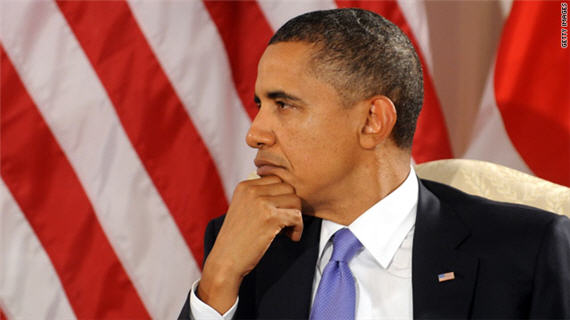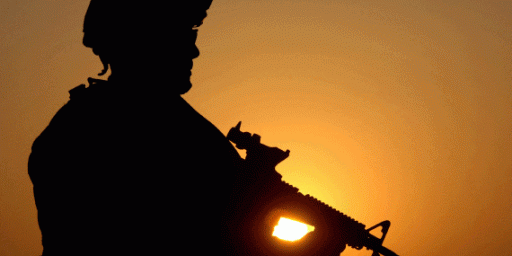The Intervener’s Dilemma
There are many opportunities to go to war. Here's a guide for choosing between them.
Andrew Sullivan captures the problem of the thing –don’t call it a war!–that we’re not leading in Libya and which isn’t aimed at regime change:
The regime is shooting unarmed civilians at will – killing scores. We must surely stop this. Oh, wait. It’s Yemen, and we support the regime. Meanwhile, the Bahrainian autocracy, backed by the Saudi theocracy, “cleanses” its capital city of the symbols of democratic hope, with the assistance of foreign troops. But we are somehow able to resist the impulse to intervene – and maintain diplomatic relations with the royal family there.
The trouble with intervening somewhere is that it begs the question of: why not somewhere else? If the motive is entirely humanitarian, and involves no “vital national interest”, then how can it be compatible with allowing, say, the Iranian dictatorship to kill, shoot dead, torture and disappear countless Iranians who peacefully sought real change?
Via Twitter, Michael Drew has noted that Sullivan seems to only support wars started by Republicans and to oppose all started by Democrats. The same has been more-or-less true for me. But I don’t think partisanship is the explanation.
Going just off the top of my head–I’m sure I’m leaving some out–here are the post-Cold War military actions the United States has undertaken.
- Somalia: Initially, a humanitarian intervention by an outgoing George H.W. Bush in response to a civil war-induced famine. I actually opposed this, although not strenuously. I tend to support pure relief efforts and this was intended to be that. Indeed, it more-or-less worked out to be that; recall new President Bill Clinton greeting the desert camouflaged troops at the White House. But, alas, we got sucked into a warlord chasing exercise that culminated in the infamous Blackhawk Down nightmare.
- Bosnia: Bush and then Clinton wisely avoided intervening here but then Clinton got sucked in by the humanitarian debacle. UN and NATO peacekeepers were powerless to stop atrocities, so we got involved.
- Kosovo: Another of the civil wars in the former Yugoslavia.
- Haiti: We threatened and began launching war to restore a democratically elected thug to power in favor of a group of thugs who took power by force. Ultimately, the incumbent thugs agreed to a buy-out and it became a modestly embarrassing peacekeeping operation.
- Rwanda: Tribal genocide is an awful thing to see on one’s TV screens. Clinton to this day says not intervening was the biggest regret of his presidency. It was also the right policy.
- Various humanitarian relief missions after earthquakes, floods, and other disasters: I supported all of them. My default position on pure humanitarian efforts is Yes; we’ve got the resources to do it, it’s the right thing to do, and there’s little downside.
- Various punitive strikes in Iraq, Afghanistan, and elsewhere: I mostly supported these, although I thought the indefinite no-fly zone over Iraq was a mistake.
- Afghanistan: Like pretty much everyone, I supported taking out the bastards who propped up those responsible for 9/11. But I just wanted regime change and a quick handover, not some absurd exercise in instituting democracy and civil society. We got both.
- Iraq: I did a reverse John Kerry here, in that I was against it before I was for it. During the long debate from late 2001 and much of 2002, I thought going in was crazy. The notion that war was justified because Saddam was an evil man who’d gassed the Kurds nearly two decades earlier struck me as absurd. But the tide turned for me when Kim Jong Il gained nuclear weapons and it became obvious that he was suddenly untouchable. At that point, the “we can’t risk Saddam getting a nuke” argument became decisive for me. But, again, I wanted regime change and destruction of (what turned out to be almost non-existent) WMD capacity, not nation-building.
- Libya: I oppose, obviously. But I’d oppose it if John McCain were president. The only difference is that he’d have done it much earlier than Obama, since his default position on interventions is Yes.
So, to recap:
- I support going to war when necessary to achieve vital U.S. national security objectives, assuming those objectives are reasonably achievable by military means. (The caveat explains why, for example, I oppose military action against Iran’s nuclear program.)
- I support deployment of U.S. military assets to further humanitarian objectives when there’s little risk in doing so.
- I oppose going to war for objectives remote to U.S. security interests, especially when the end game is unclear.
- I oppose nation-building exercises in the aftermath of wars, unless they’re of the pure reconstruction variety. We haven’t had any of the latter, however, since Germany and Japan and it’s unlikely that we’ll see other cases.






So you didn’t name what is possibly the prime motivator: if this thing was going down, we had the choice of buying a seat at the table, or not.
At the price of a few cruise missiles and some countermeasured we have a “player’s” vote in the outcome.
(Kinda dumb to still work your logic on the unilateral model.)
BTW, if you want to explain something to us, explain the genuine European zeal in this.
John,
I think decisions to go to war are unilateral, whether there’s a coalition or not. And, getting a “player’s vote” also means that we get stuck with the consequences. If the United States is part of the coalition, it’s the leader whether it wants to be or not.
And, honestly, I’m not sure I get why the Brits and French–and it’s pretty much just them; the Germans are aghast–are so hot on this. I think Cameron is a legit neocon type; not sure what Sarkozy’s game is, aside from cynical wag the dog politics.
As it stands now, I think we’re still safely within the limits of the Joyner Doctrine.
“I support deployment of U.S. military assets to further humanitarian objectives when there’s little risk in doing so.”
If we can be a good NATO neighbor and degrade Gadaffy’s AA capabilities for our French allies with our cruise missiles, all to the better. I think this qualifies as “little risk” assuming the risk refers to the potential loss of American lives.
But of course the key phrase is “As it stands now.” Events may prove me wrong.
Blood for oil !
I would not call this “war” for us. For others, certainly. If we can keep that distinction, we’re good.
James: Given that the U.S. has used the NATO alliance to further it’s own objectives (such as Afghanistan), doesn’t the U.S. owe some degree of reciprocity when the key members of that alliance ask the same?
I would not call this “war” for us. For others, certainly. If we can keep that distinction, we’re good.
We’re invading Libya’s sovereign territory, destroying their property, and killing their citizens. That’s as clear a definition of an “act of war” as you’re going to find.
What I find… troubling… is that Obama reacted so quickly to comply with our allies and the UN, and did not first make his case to Congress or the American people. He has that authority, legally, under the War Powers Act, but it’s still interesting.
J.
You might want to re-read the law, Jay. Even if the War Powers Act is constitutional (which I think is dubious), I believe that it circumscribes the president’s power a bit more than this.
@John: I define “humanitarian” interventions as those dealing with disasters, not the consequences of a civil war.
@PD Shaw: NATO joined us in Afghanistan because Article 5 demanded that they do so after we were attacked. Further, this isn’t a NATO op, it’s a UK-France-USA op. I think providing logistical and material support is one thing. Fighting a war is another.
Jay needs to look up “invading.”
(“Taking pot-shots at” seems to fit yesterday’s news.)
Perhaps it troubles you because it’s nonsense. The Russians and Chinese did not sit on their vetos because France asked them to. I love la belle France, but they don’t swing that kind of weight.
France and the UK have leaned further forward in public, but if you’re being very naive if you think this was their deal diplomatically. There’s a reason Hillary was in North Africa.
I have to agree with both of Jay Tea’s points. (other than the “invading” part)
I have a funny feeling that if john personna was on the receiving end of 110 Tomahawk missiles, he might have a different view of whether that was an act of war or an act of “pot-shots”. The idea that one state can blow up another state’s stuff (and people) without it being a war is Orwellian and grotesque. Was Japan just taking pot-shots at us at Pearl Harbor?
Chicago:
Then let’s be less Orwellian by accepting that there are different types of war with different means and objectives. This is not a war of conquest. It’s a war of intervention, using minimal means to ensure that a vengeful loon does not take a city of a million innocent people.
I think that we are beset with interventionists on the right and left. I dont see this changing for a while since it is too easy to deride someone for being weak for not wanting to go to war. Returning to the draft might stop this or at least make it less likely. The draft has its own problems too.
Steve
Pear Harbor does illustrate my point. If Japan had been vastly more powerful than us, they could have taken pot shots without risking war. History records something about a “grievous error.”
Gadaffi’s problem is that he appears old, and weak, and nobody likes him.
If Franc and Brittain were not leading on this, I certainly would not be instigating, but as it iso accept it as the way of the world. It could be a story out of last century, of five centuries before that.
A known enemy (Lockerbie?) showed weakness.
So you’re seriously saying that Pearl Harbor was only an act of war because Japan was not vastly more powerful than us? What definition of “war” are you using?
If that’s the definition of “war” that you are using, how can the US ever engage in war? We are vastly more powerful than everybody else. So I guess we’re incapable of war. Again, this is Orwellian.
@reynolds: That is a valid distinction. However, what you’re saying sounds an awful lot like what many people said to justify the Iraqi invasion. I’m leery of that argument. Once we get in — without any clear goals or exit strategy — it’s pretty darn hard to get out.
Also, how do we justify intervening in Libya while letting our allies in Bahrain and Yemen kill their dissenters? It doesn’t come off as a principled argument; it comes off as the US trying to expand its control over the region regardless of the wants and needs of the people who live there.
It’s the (international) school yard definition. Don’t blame me for it being true.
While you are putting things on me, let me ask you one. How active were you last week, the week before, in opposing Predator Drone attacks on civilians?
You want Orwellian? It is seriously Orwellian that we accept that kind of thing as background noise and only wake up when we take a background, supporting, role in a UN action led by European nations.
You want to be a peace-nik, get us the hell out of Iraq and Afghanistan.
That’s the thing TG, as I understand it michael has the most difficult position. Is he supporting Libya while wanting us out of Iraq and Afghanistan?
I’m saying I don’t give two figs about Gaddafi. Not as long as we are playing this stand-off, supporting, role. Concentrate on where our money and blood our flowing.
“It’s the (international) school yard definition. Don’t blame me for it being true.”
Actually, I was blaming you for it being false. If you can provide a source to bolster your claim that it is true, please do.
I absolutely oppose drone strikes on civilians (including American civilians, like Anwar al-Awlaki). I’ve never seen a rationale for us to be bombing Pakistan. I’m not sure what you’re getting at with the “what have you done in the last week” business. Have you done something in the past week to combat AIDS? If not, does that make you pro-AIDS? Of course not.
What’s false? That which is clearly in play?
You could tell the same story, about leaders striking at a nieghboring enemy as he faces internal dissent, 2000 years ago and people would get it.
I’m disgusted that the chattering classes are more animated by our fringe role in this than they are by the Predators (where we DO act unilaterally), or focused on this rather than withdrawal from I&A.
It is a weekend sideshow.
Chicago:
It sounds that way because that’s what it is. I don’t want to minimize the ways in which this can go wrong for us. It surely can.
“■I support going to war when necessary to achieve vital U.S. national security objectives, assuming those objectives are reasonably achievable by military means. (The caveat explains why, for example, I oppose military action against Iran’s nuclear program.)”
What constitutes “reasonably achievable by military means”?
@Joyner
Is there no definition of what “reasonably achievable” means? Or does it vary all over the map?
@Joyner
Well, you proposed a criteria called “reasonably achievable military effort”. So far, you have refused to defend it. Anyone could come up with 15 or 20 factors of significance to such a determination before the fact, and the same people would evaluate each factor differently in a given instance. So, this leads to the second question which you probably won’t address either:
Who makes the determination of ” reasonably achievable military effort ” in a given instance? Exactly who? Obama? The CJCS? Any of several groups and committees?
You used not attacking the Iranian nuclear capability as an example of your use of the criteria without defining it, or giving it any substance. Just as there are many ways to skin a cat, there are many ways to address the Iranian situation, but apparently you have selected only one way–that of air attack, which, by itself, would be highly problematical, I agree.
Second, you didn’t address the seriousness of the nuclear threat from Iran to the US and to our allies and friends, either directly, or via surrogate terrorist organizations that would love to outdo the 9/11 attack with a really big bang, or at the least see the US humbled and held hostage through the threat of destruction of five or six of our largest cities by planted nuclear devices. In that scenario, we would lose one more city and its population as a clear proof that the threat is real, say NYC.
Third question: So if that is the threat, what is “reasonably achievable military effort “right now? before this possibility arises? Quite an elastic criteria, I believe, and one that few could reasonably apply given the poor intel that exists. What is a city full of people worth? What are five cities worth?
What is reasonable military effort here?
Seems to me that you must match the effort to the threat.